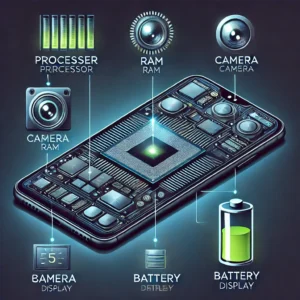What to Look for When Buying a New Phone: A Simple Guide
Buying a new phone can feel overwhelming. With so many options, features, and price ranges, it’s easy to get lost in the sea of tech jargon. But don’t worry—I’m here to break it down for you in plain English. Here are the most important specs to consider when picking your next phone, so you can make a decision that fits your needs without feeling like you need a degree in engineering.
1. Budget: How Much Are You Willing to Spend?
Let’s start with the obvious: your budget. Phones can range from 100toover1,000, so it’s important to know how much you’re comfortable spending. The good news is that there are great options at every price point. Just remember, the most expensive phone isn’t always the best one for you.
2. Operating System: iOS or Android?
This is the big fork in the road. Do you prefer Apple’s iOS (iPhones) or Google’s Android (Samsung, Google Pixel, etc.)? Here’s the quick breakdown:
- iOS: Sleek, user-friendly, and great if you’re already in the Apple ecosystem (Mac, iPad, Apple Watch).
- Android: More customizable, with a wider variety of devices and price ranges.
If you’re already used to one system, switching might feel like learning a new language. But if you’re open to change, both have their perks.
3. Battery Life: Will It Last All Day?
There’s nothing worse than your phone dying in the middle of the day. Look for a phone with a battery capacity of at least 4,000mAh if you’re a heavy user. Also, check reviews to see how long the battery lasts in real-world use—some phones are more efficient than others.
Pro tip: Phones with fast charging or wireless charging can be a lifesaver when you’re in a hurry.
4. Storage: How Much Space Do You Need?
Think about how you use your phone. Do you take a lot of photos, download apps, or store music and videos? If so, aim for at least 128GB of storage. If you’re a light user, 64GB might be enough. Some phones also let you expand storage with a microSD card, which is a nice bonus.
5. Camera: Are You a Photo Person?
If you love taking photos, the camera specs matter. Look for:
- Megapixels (MP): Higher isn’t always better, but it’s a good starting point.
- Number of lenses: Ultra-wide, telephoto, and macro lenses add versatility.
- Low-light performance: Check reviews to see how the camera performs in dim lighting.
Don’t forget about the front camera if you’re into selfies or video calls!
6. Display: How Good Does It Look?
The screen is your window to the phone, so you want it to be sharp and vibrant. Here’s what to look for:
- Size: Bigger screens are great for videos and gaming, but smaller ones are easier to handle.
- Resolution: 1080p (Full HD) is standard, but 1440p (Quad HD) is sharper.
- Refresh rate: A 90Hz or 120Hz display makes scrolling and animations smoother.
7. Performance: Will It Keep Up with You?
If you’re a gamer, multitasker, or just want a phone that won’t slow down, pay attention to the processor and RAM:
- Processor: Look for recent chips like Apple’s A-series, Qualcomm Snapdragon 8-series, or MediaTek Dimensity for Android.
- RAM: 6GB is good for most users, but 8GB or more is better for heavy multitasking or gaming.
8. 5G: Is It Worth It?
5G is the next generation of mobile internet, offering faster speeds. If you plan to keep your phone for several years, 5G is a good future-proofing feature. But if you’re on a budget or live in an area without 5G coverage, it’s not a must-have yet.
9. Durability: Can It Survive Your Lifestyle?
If you’re clumsy or outdoorsy, look for phones with:
- Water resistance: IP67 or IP68 ratings mean it can handle spills or rain.
- Tough build: Gorilla Glass or similar materials can protect against drops and scratches.
10. Software Updates: How Long Will It Stay Fresh?
Phones get slower over time, but regular software updates can keep them running smoothly. Apple typically supports iPhones for 5-6 years, while Android phones vary by brand (Google Pixel and Samsung are usually the best for updates).
Bonus: Extras That Might Matter to You
- Headphone jack: Rare these days, but some phones still have them.
- Expandable storage: MicroSD card slots are handy for extra space.
- Biometric security: Fingerprint sensors or facial recognition for quick unlocking.
Final Thoughts
The “best” phone isn’t the one with the most specs—it’s the one that fits your lifestyle and budget. Think about what you use your phone for most (photos, gaming, social media, etc.) and prioritize those features. And don’t forget to check reviews and hands-on videos to see how the phone performs in real life.
Happy phone shopping!



